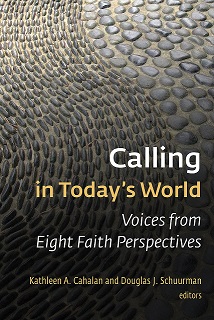Calling in Today's World: Multifaith Perspectives
Panel discussion
Thursday, September 29, 2016, 7:00 PM
Quad 264, Saint John's University
 What does a Buddhist think about calling? Does a Jew have a similar sense of vocation as a Christian? Do people besides Christians have a sense of calling? While most religious traditions do not share the same notion of calling as Christians, they do, in fact, have surprisingly similar concepts and practices.
What does a Buddhist think about calling? Does a Jew have a similar sense of vocation as a Christian? Do people besides Christians have a sense of calling? While most religious traditions do not share the same notion of calling as Christians, they do, in fact, have surprisingly similar concepts and practices.
In a new book, Calling in Today's World: Voices from Eight Faith Perspectives, experts representing Jewish, Islamic, Hindu, Buddhist, Confucian, Daoist, secular humanist, and Catholic and Protestant Christian traditions explore how callings are experienced and lived within their communities of faith. This ground-breaking volume offers key texts, stories, persons, concepts, and discernment practices that exemplify each tradition's view of vocation as well as how modern life poses both difficulties and opportunities for living out a sense of calling.
As the United States becomes more religiously diverse, members of faith communities meet every day in college classes, work places, neighborhoods, volunteer organizations, and efforts for social change. If people of faith want to live and work together for the common good, understanding each other's values and beliefs is imperative. Learning how others experience a sense of calling and live with meaning and purpose can enliven and deepen connections across communities.
The three panelists for this program - representing the Jewish, Hindu, and Buddhist traditions - are contributors to Calling in Today's World, and the moderator - a Christian - is one of the book's editors.
Panelists:
Amy Eilberg, the first woman ordained a rabbi in Judaism's Conservative Movement, teaches and practices inter-religious and intra-Jewish dialogue. Deeply involved in the work of peace and reconciliation, she is the author of From Enemy to Friend: Jewish Wisdom and the Pursuit of Peace (Orbis Books, 2014).
Anantanand Rambachan is professor of religion, philosophy, and Asian Studies at St. Olaf College, specializing in the Hindu tradition and interreligious dialogue. A prolific author, his most recent book is A Hindu Theology of Liberation: Not-two Is Not One (SUNY Series in Religious Studies, 2015).
Mark Unno is associate professor and religious studies advisor in the department of philosophy at the University of Oregon. He is author of Shingon Refractions: Myōe and the Mantra of Light (Wisdom Publications, 2004) and editor of Buddhism and Psychotherapy Across Cultures: Essays on Theories and Practices (Wisdom Publications, 2006).
Moderator:
Kathleen A. Cahalan is professor of theology at Saint John's School of Theology and Seminary and director of the Collegeville Institute Seminars. She is editor, with Gordon Mikoski, of Opening the Field of Practical Theology (Rowman and Littlefield, 2014) and co-author of Christian Practical Wisdom (Eerdmans, 2016).
Sponsored in collaboration with the Collegeville Institute and the Saint John's School of Theology.
